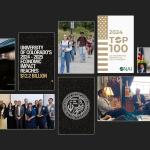For more than two decades at CU Boulder and a decade at CU Denver, the Learning Assistant model has strengthened classroom learning by empowering students to serve as peer mentors and instructional leaders. Now, thanks to a CU Next system award, that impact is expanding systemwide – including at UCCS – marking a new chapter for the nationally recognized approach. Watch the video to see how the Learning Assistant model is evolving at CU – and why it continues to shape the future of teaching and learning.
The University of Colorado has entered into an agreement with OpenAI to provide secure, institutionally controlled access to ChatGPT EDU for students, faculty and staff across all four campuses and the CU system office, university leaders announced.
Chad Marturano’s career began in government and public policy, where he developed a front-row perspective on how financial decisions shape outcomes for communities across the state. Marturano has served as CU vice president and chief financial officer since 2022. He advises system leadership, campus CFOs, state agencies and the Board of Regents on complex choices that influence CU’s mission of educating students, advancing research and delivering life-changing health care.
News of prestigious accolades for University of Colorado faculty and staff drew readers to CU Connections throughout 2025. Details of impressive measures of CU’s impact within the state and across the nation also proved popular reading. Revisit these highlights by exploring our Top 10 list of the most-read features from the past year.
When Alexes Hernandez moved from New Mexico to Colorado Springs, college was the plan. She didn’t expect to also become a business owner with a growing online following. But with support from UCCS entrepreneurship resources, her product now reaches thousands across TikTok and Instagram. Hernandez’s story is part of the recently published CU Innovation and Entrepreneurship Impact Report for 2024-25. Alongside facts and figures demonstrating the power of CU’s innovation engine, the report features several profiles of student entrepreneurs across the four campuses.
As CU’s chief procurement officer, Ed Mills oversees purchasing, contracting, strategic sourcing, travel, expenses, data analytics and technology for the university, which he likens to operating a handful of small cities. “Each (campus and system administration) needs supplies, services and support to function,” he said. “My team makes sure those things are there, on time and at scale, in support of each one’s mission.” Mills shares his thoughts on what constitutes good procurement, how CU works to strengthen Colorado businesses and the next frontier in his field.













